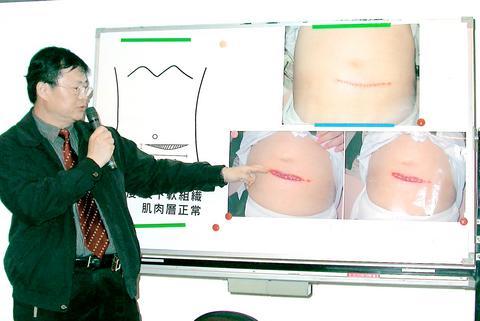Doctors at the Chi Mei Medical Center in Tainan said yesterday afternoon that both President Chen Shui-bian (陳水扁) and Vice President Annette Lu (呂秀連) were in stable condition after yesterday's shooting, with Chen sustaining a laceration wound to his lower abdomen and Lu a wound to her right kneecap.
"President Chen's wound was 11cm long and 2cm wide. The wound ran horizontally across his lower abdominal region and was 2 cm deep," said Chi Mei Medical Center superintendent Steve Chan (
Chan said that Chen's wound had been disinfected and that contaminated tissue was removed before he was given 32 stitches. Chan said that Chen had not sustained any internal injuries and that the wound had only reached tissue just under the skin.

PHOTO: WANG YU-TING, LIBERTY TIMES
Chan also said that Lu had sustained a 2cm external wound on her right kneecap and that she received local anesthesia. No foreign matter was found in Lu's wound.
Both Chen and Lu left the hospital at around 7pm yesterday evening, bound for Taipei.
X-rays and computerized tomography scans (CT scans) that Chen underwent after his wound had been treated revealed that metallic material, identified as part of a bullet, was deposited between his body and his jacket in his lower back area.
Hospital officials explained that damage to Chen's jacket indicated that a bullet had penetrated from Chen's right and exited on his left.
Chan said that Chen had walked into the medical center under his own power at around 2pm yesterday and that an initial examination showed his vital signs to be stable. His blood pressure was 142 over 74, his pulse was 84 beats per minute and he was breathing at a rate at 22 breaths per minute. Despite his stable vital signs, Chen was treated in the hospital's intensive care unit.
According to Chan, Chen informed doctors that at the time of the shooting he heard a sound but at first did not realize that he had been injured. A little while later, he began to feel pain in his abdominal area.
The medical team that was traveling with Chen sent him to the hospital after noticing that he was bleeding.
Center officials said that Chen's condition would remain stable as long his wound did not become infected. Chen was prescribed antibiotics in order to prevent infection.
Hospital authorities said that Chen's jacket, the bullet and other items that might be relevant to the police's investigation into the matter would be handed over to appropriate authorities.
Chan said that Chen appeared calm and alert.
Upon entering the hospital, Chen spoke with first lady Wu Shu-chen (
National Taiwan University Hospital spokesperson Lin Ho-shing (林鶴雄) said that the hospital's emergency contingency committee had held a meeting upon learning of the shooting.
He said that the hospital was on standby yesterday afternoon in the event that Chen had to be transfer-red there for treatment.

Alain Robert, known as the "French Spider-Man," praised Alex Honnold as exceptionally well-prepared after the US climber completed a free solo ascent of Taipei 101 yesterday. Robert said Honnold's ascent of the 508m-tall skyscraper in just more than one-and-a-half hours without using safety ropes or equipment was a remarkable achievement. "This is my life," he said in an interview conducted in French, adding that he liked the feeling of being "on the edge of danger." The 63-year-old Frenchman climbed Taipei 101 using ropes in December 2004, taking about four hours to reach the top. On a one-to-10 scale of difficulty, Robert said Taipei 101

A preclearance service to facilitate entry for people traveling to select airports in Japan would be available from Thursday next week to Feb. 25 at Taiwan Taoyuan International Airport, Taoyuan International Airport Corp (TIAC) said on Tuesday. The service was first made available to Taiwanese travelers throughout the winter vacation of 2024 and during the Lunar New Year holiday. In addition to flights to the Japanese cities of Hakodate, Asahikawa, Akita, Sendai, Niigata, Okayama, Takamatsu, Kumamoto and Kagoshima, the service would be available to travelers to Kobe and Oita. The service can be accessed by passengers of 15 flight routes operated by

Taiwanese and US defense groups are collaborating to introduce deployable, semi-autonomous manufacturing systems for drones and components in a boost to the nation’s supply chain resilience. Taiwan’s G-Tech Optroelectronics Corp subsidiary GTOC and the US’ Aerkomm Inc on Friday announced an agreement with fellow US-based Firestorm Lab to adopt the latter’s xCell, a technology featuring 3D printers fitted in 6.1m container units. The systems enable aerial platforms and parts to be produced in high volumes from dispersed nodes capable of rapid redeployment, to minimize the risk of enemy strikes and to meet field requirements, they said. Firestorm chief technology officer Ian Muceus said

MORE FALL: An investigation into one of Xi’s key cronies, part of a broader ‘anti-corruption’ drive, indicates that he might have a deep distrust in the military, an expert said China’s latest military purge underscores systemic risks in its shift from collective leadership to sole rule under Chinese President Xi Jinping (習近平), and could disrupt its chain of command and military capabilities, a national security official said yesterday. If decisionmaking within the Chinese Communist Party has become “irrational” under one-man rule, the Taiwan Strait and the regional situation must be approached with extreme caution, given unforeseen risks, they added. The anonymous official made the remarks as China’s Central Military Commission Vice Chairman Zhang Youxia (張又俠) and Joint Staff Department Chief of Staff Liu Zhenli (劉振立) were reportedly being investigated for suspected “serious